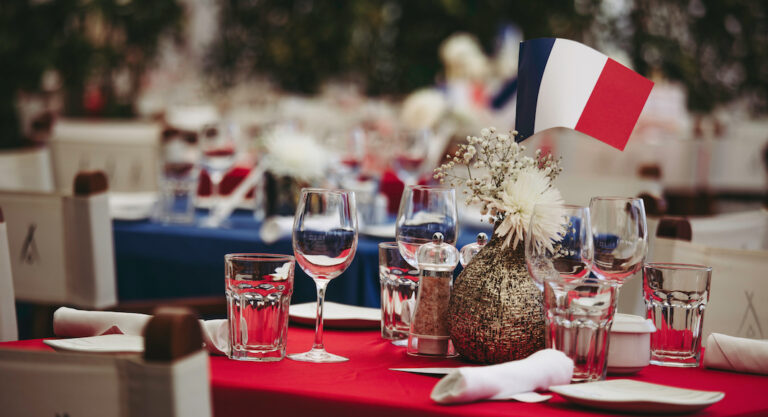Every year, when April comes around, the gullible around the world must beware the tricks and pranks that accompany April Fools’ Day. But if you think this jokester’s holiday is merely an American tradition, you would be sorely mistaken. The French have a long history of celebrating Poisson d’Avril, or April Fools’ Day, though the name literally translates to “April Fish.” Le premier avril, as it is otherwise known, is beloved by French children and mischievous grown-ups alike, who might celebrate by playing an April Fools’ prank on their teachers, friends, or colleagues. But how did April Fools’ Day come to be known as Poisson d’Avril? There are many theories, but you’ll need to dig into a little French history to uncover them.
What are the Origins and History of Poisson d’Avril?
The origins of “April Fish Day” in France date back to medieval times. One theory revolves around the fact that until 1564, New Year’s Day was celebrated on March 25 in Europe. (Which makes sense–spring is a time of new beginnings, so why wouldn’t it mark the start of the new year?) By some accounts, these celebrations would last an entire week, culminating on April 1st. But then came the Edict of Rousillon, in which King Charles IX announced a new calendar, what we now know as the Gregorian calendar, which would have the new year start on January 1st. The story goes that some people refused to celebrate the new year in January, and continued to celebrate at the start of spring. Those who clung to tradition instead of adapting to the times became the subjects of ridicule, and ended up on the receiving end of many a joke. People would invite them to parties that didn’t exist, or send them gag gifts.
But references to Poisson d’Avril and April Fools predate this event by quite some time. A 1508 poem by French poet Eloy D’Amerval called Le Livre de la Deablerie (The Book of Deviltry) contains what is thought to be the first reference to a “Poisson d’Avril.” The poem includes a line that reads: “Maquereau infâme de maint homme et de mainte femme, poisson d’avril” (“infamous mackerel of many a man and woman, the April fish”). It’s not specified in the poem if the “Poisson d’Avril” refers to April 1st in particular, as it could just refer to a foolish person.
The point is that no one really knows why April 1st became a day of jollity and pranks in France. But the holiday sure has managed to have some staying power.
The French traditions of April Fools’ Day
April Fools’ Day in France is celebrated in many of the same ways that the holiday is celebrated around the world, with people playing pranks on any foolish person they might come across. Fake news is a real thing to be worried about on Poisson d’Avril, since news outlets often share bogus news, only to reveal the joke the next day. (Though April Fools’ Day pranks by major news outlets have decreased since 2020, as many newspapers and other outlets are afraid of accidentally sowing misinformation.) In 1986, Le Parisien published a story that Walt Disney had purchased the Eiffel Tower, which was to be moved to the future site of Disneyland Paris at Marne la Vallée. In 2009, France 2 aired a newscast explaining that days would now be 25 hours long, because the Earth’s rotation was being slowed thanks to wind turbines. And in 2019, the French National Police announced that it would start recruiting rabbits in lieu of dogs.
The Paris métro loves to play around on Poisson d’Avril as well. In 2009, the RATP replaced their normal announcer with the voice of Homer Simpson, who offered goofy travel advice for passengers. Then, in 2016, the RATP changed the signs at several métro stations. The Pyrénées station became “Alpes,” Alexandre Dumas became “Les Trois Mousquetaires” (The Three Musketeers), Quatre Septembre became “Premier Avril,” and many more.
But the most iconic French tradition celebrated on April Fools’ Day revolves around paper fish. Yes, Poisson d’Avril is a rather literal holiday, as it is celebrated by sticking paper fish to the backs of unsuspecting others. Whoever has the fish stuck to them becomes the “April Fish,” similar to the American idea of the “April Fool.”
Why are fish associated with the French April Fool’s Day?
Historians suggest many theories for the paper fish tradition that gives Poisson d’Avril its name. But the most common explanation is that April is considered the start of fishing season in France, and the abundance of fish makes them easy to catch. From there you can draw a line from fish “taking the bait” to gullible people falling for practical jokes. Hence, the April Fool becomes the Poisson d’Avril.
One other theory links the paper fish to the Christian period of Lent, which often overlaps with the first of April. Since Christians are advised to avoid meat on certain days during Lent, eating fish was a common alternative. Though what this might have to do with practical jokes is beyond me.
Yet another explanation ties the fish connection to the gag gifts that traditionalists received after the Edict of Roussillon, which may have included fake fish.
How to say “April Fools!” and “April Fools’ Day” in French
Both “April Fools” and “April Fools’ Day” can be translated as “Poisson d’Avril” in French. This day in France has the same name as the expression you shout when a prank has successfully been discovered.
French Words for Pranks, Tricks, and Practical Jokes
- Un canular – hoax
Ex. T’as vu le canular sur France 2 ? Avec les lapins policiers ? (Did you see the hoax on France 2? With the police rabbits?)
- Une blague/une plaisanterie – joke
Ex. Les enfants adorent faire des blagues/plaisanteries. (Kids love jokes.)
- Déconner/Plaisanter/Blaguer – to kid around/to joke
Ex. Je déconne/plaisante/blague ! C’était juste une blague/plaisanterie. (I’m kidding! It was just a joke.)
- Ranconter des histoires – to lie (literally: to tell stories)
Ex. Arrête de raconter des histoires! Je connais la vérité. (Stop lying! I know the truth.)
- Faire des bêtises – to mess around
Ex. T’es un adulte. Pourquoi insistes-tu pour faire des bêtises ? (You’re an adult. Why do you insist on messing around?)
- Une farce – prank
Ex. Je vais elle faire une farce avec ce poisson en papier. (I’m going to play a prank on her with this paper fish.)
- Un jeu de mot – pun
Ex. J’adore les jeux de mot. Sais-tu ce qu’est le sport le plus silencieux ? Le parachuuuuuut ! (I love puns. Do you know what is the quietest sport? Para-shush-ing!)






